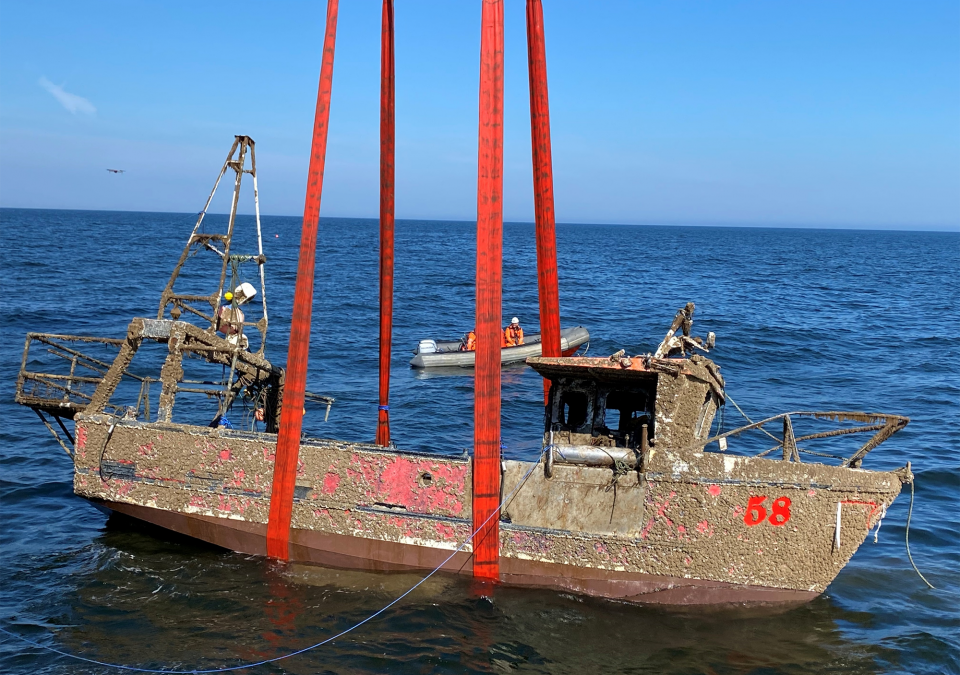Report on the investigation of the foundering of the whelk potter Nicola Faith, resulting in three fatalities, in Colwyn Bay, north Wales, 27 January 2021.
Summary:
On 27 January 2021, the whelk potter Nicola Faith capsized and sank 1.9 miles north of Rhos-on-Sea, north Wales with the loss of its three crew members.
The vessel had been extensively modified during its life which had significantly reduced its margin of positive stability. On the day of the accident the Nicola Faith had been loaded with catch and retrieved strings of pots to the point of instability, which resulted in the capsize and subsequently sinking of the vessel. Nicola Faith had not been fitted with a mandatory emergency beacon to alert to the capsize, and it was not reported as overdue until 1000 the next day.
Following its salvage by the MAIB, a thorough inspection of the vessel was carried out to determine possible modes of capsize and a full assessment of its stability was undertaken.
The key safety issues identified were:
- Nicola Faith was operated in an unsafe manner and was loaded with a combination of catch and retrieved fishing gear to the point of instability.
- A mandatory Emergency Position Indicating Radio Beacon (EPIRB) was not fitted to the vessel and the crew were not equipped with personal locator beacons.
- Nicola Faith was found to have been extensively modified; these modifications had eroded its margin of positive stability.
- Maritime and Coastguard Agency surveyors had noted some of the modifications, however, the guidance concerning modifications that would have triggered a stability assessment was not sufficiently clear.
- Although available on board, the crew did not routinely wear personal flotation devices.
Safety recommendations:
The Maritime and Coastguard Agency is recommended to:
- Revise the wording in MSN 1871 Amendment No. 2 (F) The Code of Practice for the Safety of Small Fishing Vessels of Less than 15m Length Overall to refer to a load limit rather than a catch limit.
- Review and enhance the guidance to surveyors contained in MSIS 27 Chapter 3 to clarify what level of modification triggers further investigation into a vessel’s stability.
The Big Ship Ltd is recommended to:
- Ensure that a written agreement is in place to identify the organisation or person with responsibility for the operation of any vessels that it may own.
The full report can be downloaded here https://assets.publishing.service.gov.uk/media/62b08c828fa8f53574bf8ba5/2022-8-NicolaFaith-Report.pdf
Andrew Moll OBE, Chief Inspector of Marine Accidents, said:
“Yesterday we published our report into the loss of Joanna C, and today are publishing the report into the loss of Nicola Faith. Both were small fishing vessels that capsized while working fishing gear and together, tragically, they account for the loss of five lives. There are important lessons about stability from these accidents that must be understood and acted upon by all small fishing boat operators.
“The first lesson is that modifications, unless properly planned, can significantly erode a vessel’s margin of stability. The scallop dredger Joanna C had been modified, but the process of assessing the effect of the alterations had not been completed before the vessel returned to fishing. Unfortunately, the modifications had eroded Joanna C’s stability to the extent that simply snagging a dredge on a string of pots was enough to capsize the vessel. Tragically, only one of the three crew survived the accident. It is essential that skippers know the limitations of their vessels, and that any modifications to the vessel or changes to fishing methods are properly assessed and approved before fishing resumes.
“The second lesson is that any vessel can become unstable if overloaded. Nicola Faith had been modified, and the modification had not been approved. Nonetheless, the vessel could have been operated safely with care. On the day of the accident, the crew were relocating their pots to a new area and were carrying a full day’s catch as well. The combined weight of the catch and fishing gear piled on deck was far more than the boat was designed to carry; it capsized, and all three crew were lost in that accident. Fishermen will always be tempted to land a big catch but moving fishing gear at the same time can be overwhelming.
“As fuel prices soar, the temptation to carry more and do fewer trips makes economic sense, but where stability is concerned the results can be catastrophic.
“Five families’ lives have been shattered by these two accidents, both of which were entirely avoidable. To all fishing vessel crews I have this simple message: Safety begins with good stability; know your boat’s limitations and operate within them.”



Recent Comments